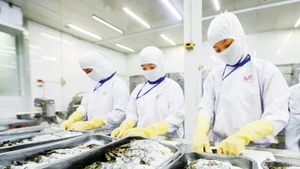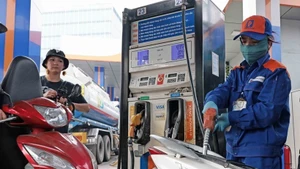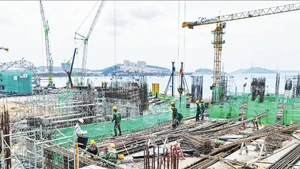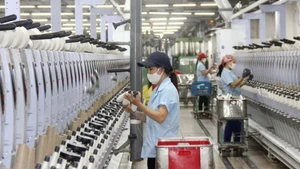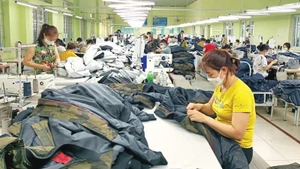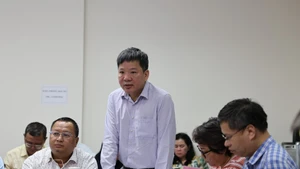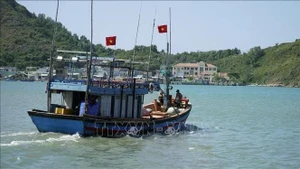According to the Director of the Department of Credit for Economic Sectors (SBV) Ha Thu Giang, closely following the major policies of the Party and the Government, the banking sector has always identified “agriculture, farmers and rural areas” as one of the priority areas for credit capital investment.
The latest data from the SBV shows that, to date, outstanding credit for agriculture and rural areas has reached nearly 3.3 million billion VND, accounting for 1/4 of the total credit capital of the entire economy. Of which, outstanding corporate debt is about 31.5%. Outstanding loans for individuals, households, and business households are about 68.3%, and outstanding loans for cooperatives and other subjects are about 0.25%.
Currently, the country has more than 90 credit institutions and nearly 1,100 people’s credit funds participating in lending to serve agricultural and rural development, with an expanded network covering remote and isolated areas to help people in difficult areas easily access loans and banking services.
To ensure that capital for “agriculture, farmers and rural areas” is available, the banking sector regularly reviews and perfects the legal framework, especially regulations on credit granting activities. They manage monetary policy and contribute to stabilising the macro economy, controlling inflation, and creating favourable conditions for all sectors to invest in this sector.
The SBV also promptly issues instructions directing the implementation of credit programs and policies in the agricultural sector and directs the flow of credit capital into the agricultural and rural sectors. They review and simplify processes and procedures, shorten loan approval time, and create favourable conditions for customers to access credit capital.
In addition, the SBV has advised the Government to issue Decree No.55/2015/ND-CP dated June 9, 2015, on credit policies for agricultural and rural development, Decree No.116/2018/ND-CP dated September 7, 2018, amending and supplementing Decree No.55/2015/ND-CP to better meet the requirements of restructuring the agricultural sector in the new situation. This helps coordinate with ministries, branches, localities, and socio-political organisations to promote propaganda and information on credit policies and guidelines for agricultural and rural development, etc.
Most recently, the Ministry of Agriculture and Rural Development and the SBV of Vietnam signed a coordination regulation to promote agricultural and rural credit. Previously, the ministry also signed a cooperation agreement with the Bank for Agriculture and Rural Development of Vietnam (Agribank) to promote agricultural credit associated with agricultural insurance according to the value chain and development of raw material areas, etc.
As a bank playing a key role in investing in the development of “agriculture, farmers and rural areas”, Deputy General Director of Agribank Hoang Minh Ngoc said that the proportion of loans to the “agriculture, farmers and rural areas” sector at the bank in recent years has always accounted for more than 60% of total outstanding loans.
With the goal of sustainable development and “leaving no one behind”, policy credit capital through the Social Policy Bank has contributed to creating big changes in poor areas, and the appearance of rural areas, remote areas and isolated areas has improved.
According to Deputy General Director of the Vietnam Bank for Social Policies Nguyen Duc Hai, the bank is currently implementing nine social policy credit programs, contributing to the construction of new rural areas. Thanks to this capital, poor households and other policy beneficiaries in rural areas, especially ethnic minorities and mountainous areas, have developed production and business, risen out of poverty, and improved their material and spiritual lives.
Although the banking sector always creates favourable conditions in terms of mechanisms and policies, giving the highest priority when focusing on credit investment, due to objective and subjective practical reasons, credit capital flows towards the “agriculture, farmers and rural areas” still face many difficulties and obstacles.
Vu Duy Hung, Deputy Head of the Executive Board of the Farmers’ Support Fund (Vietnam Farmers’ Union), shared that in recent years, through the activities of the Farmers’ Support Fund system and coordination programs with the banking sector, the Vietnam Farmers’ Union has promoted activities to effectively support credit capital for members, farmers in production, business, etc., achieving many remarkable accomplishments.
To date, the total outstanding credit balance entrusted through the Vietnam Farmers’ Union has reached more than 185 trillion VND, with more than 2.6 million members borrowing capital.
However, Hung also pointed out some difficulties in practice, such as climate change is becoming increasingly complex, greatly affecting agricultural production. Agricultural and rural infrastructure is still weak, not meeting the requirements of large-scale, high-standard commodity production from the international market. On the other hand, most farmers produce on a small scale, fragmented basis, and lack linkages in production stages, leading to difficulties in accessing capital from the banking system.
Meanwhile, for the banking sector, Ha Thu Giang also pointed out some difficulties in lending to the “agriculture, farmers and rural areas” today. Accordingly, the main source of capital mobilised from economic organisations and residents often has short-term and market interest rates, when provided to credit institutions for implementation, it will encounter conflicts to provide cheap, long-term loans to the “agriculture, farmers and rural areas.
Another difficulty is that when lending to the “agriculture, farmers and rural areas”, there is no collateral, while the financial and management capacity of a segment of customers in the agricultural and rural areas is limited, and the production and business plans are not convincing. The ability to manage loan cash flow still faces many difficulties.
Therefore, for credit to support “agriculture, farmers and rural areas” to develop quickly and sustainably, there needs to be synchronous coordination from the Central to local levels with specific solutions. In particular, special attention should be paid to agricultural insurance policies by expanding the scope and supporting insurance premiums for farmers cultivating large areas in areas prone to natural disasters, guiding businesses to develop agricultural insurance products.
Agribank Deputy General Director Hoang Minh Ngoc proposed that the Government, ministries, and branches consider and develop a policy credit program in the direction of separating policy credit and commercial credit, avoiding the idea of relying on state budget capital, directly supporting beneficiaries, having a debt settlement mechanism for loans without collateral according to Decree No. 55/2015/ND-CP. This prioritises Agribank as a bank serving investment trust projects for the “agriculture, farmers and rural areas” sector.
Along with that, ministries and branches should strengthen trade promotion, seek domestic and export markets, create stable output markets for agricultural and rural products, etc.
Representative of the Farmers Support Fund, Hung also proposed that the banking sector promote agricultural and rural credit entrustment activities through coordination with socio-political organisations, surveying needs to build products and services suitable for each customer segment, expanding the service supply network, especially in rural areas and applying digital technology to agricultural activities. This effectively integrates capital lending and technology transfer, business guidance, vocational training, and building and replicating effective production and business models.



